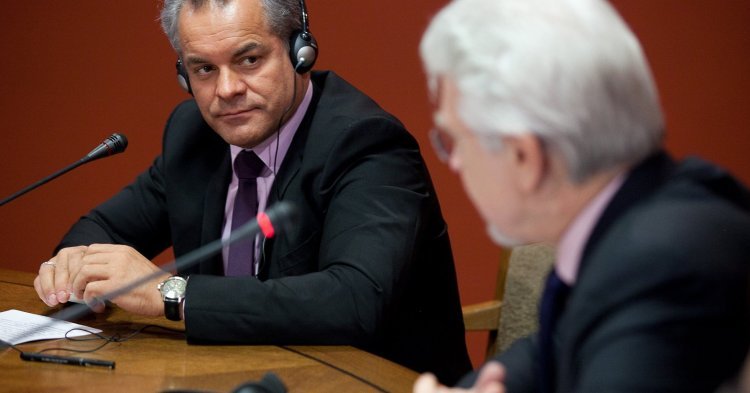A proposal advertised through propaganda
The proposal is coming from the centre-left party, the Democratic Party of Moldova. It was introduced by its leader, Vladimir Plahotniuc, in a press conference on March 6th, 2017. The Democratic Party of Moldova, a self-proclaimed pro-European party, is currently the faction retaining the relative parliamentary majority – despite obtaining only 15,8% of the votes in the parliamentary elections of 2014. The party, as well as its leader, is the subject of numerous polemics. It is thought to have bribed MPs from other parties to participate in a coalition government led by the DPM in order to enable the party to control every single vital structure of the state – from which comes the attributed notion “captive state”. More importantly, the leader is thought to be involved in the major bank fraud in 2014 that has seen 1 billion USD – roughly 15% of Moldova’s GDP – disappear from three Moldovan banks: Banca de Economii, Banca Socială, and Unibank.
The DPM is nonetheless one of the most visible parties, due to its financial resources and the media empire owned by Vladimir Plahotniuc, used as a propaganda machine and an instrument for manipulating the masses.
The proposal has therefore gained huge support from the affiliated media, making its way into the public debate on numerous tracks – from the information campaign carried out by the DPM’s leaders to advertisements, flyers, banners, websites, and, importantly, televised propaganda. However, legal experts, intellectuals, opposition parties – including Maia Sandu, the candidate for the presidency of Moldova in the recent elections of October 2016 - are reticent to the proposal, and show signs of concern for what the reform could mean for the democratic basis of Moldova.
Why is the proposed reform so dangerous?
As the legal advisor Sorina Macrinici suggests, “The reform will be benefitting only the big parties with financial resources, which are the Democratic Party of Moldova and the Socialist Party of the Republic of Moldova. The uninominal system, in the proposed formula, discourages the consolidation of trends and emerging political parties and undermines the role of the opposition which is an indispensable force for a genuine democracy. Moreover, it makes any opposition almost impossible, because the deputy in the opposition would be at a constant risk of dismissal due to his/her impossibility to fulfill the mandate.
Additionally, the campaign of the DPM for collecting signatures for the proposal is based, primarily, on the possibility to dismiss a deputy, which represents a problem on various levels. Firstly, it is only used in communist regimes: China, North Korea, Vietnam and Cuba – no democratic system, nor the Constitution of Moldova is comprising this possibility. Secondly, the revoking procedure provided in the project is practically impossible to transpose in reality: for the dismissal, more votes will be necessary than for the election of a deputy and it is also impossible to revoke a deputy on its first or last year of mandate. Furthermore, it does not comply to the Constitution of Moldova – which means that the project already has an internal contradiction – what DPM is proposing is a mechanism that does not act in accordance with the existing norms and for which a cardinal modification of the Constitution is necessary.
The current Constitution establishes certain guarantees for the successful fulfillment of democracy and government. It is the warranty of human rights, respecting the values, the functioning of the institutions and the separation of powers. The modification of it should not occur whenever a political party needs to satisfy its interests, by reducing our democratic stands.”
Sustaining the oligarchic system to the detriment of Moldova’s European path
After the proposal, an online petition against the reform was launched. It aims to raise awareness of the dangerousness of a possible introduction of the new law, by delineating the main challenges it implies:
Reforming the electoral system in a way that benefits the already existing corrupt and vicious cycles is not only distracting the public opinion from the problems that Moldovan society is facing, by giving the population the illusion of being in command. It is also accentuating the problems, such as the capturing of state institutions and the mass media by one party, and the large-scale disinformation campaigns.
On the current terms of the democratic process: vicious and frequently mimed, the political and social consensus, required for a free and correct electoral process within the uninominal system, is missing. Therefore, any modification at the present time, will be lacking legitimacy.
Therefore, the thrust towards the renewed system is substantially reinforcing the oligarchic system and the vicious circle that not only undermines the growth potential of Moldova but practically and effectively estranges Moldova from the EU, keeping the democratic values and the effective respect of them only on paper, despite being formally embraced by the so-called pro-European government.

Follow the comments: |
|
